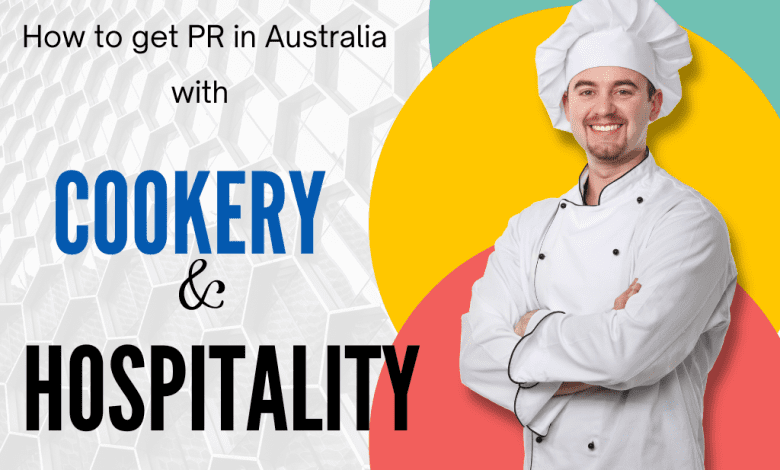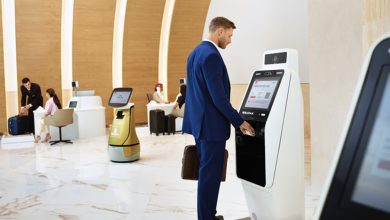A Complete Guide to Get PR in Australia with Cookery and Hospitality
A Complete Guide to Get PR in Australia with Cookery and Hospitality

To obtain Permanent Residency (PR) in Australia with a Cookery and Hospitality background. You would need to follow a step-by-step process.
Here’s a general overview of the steps you would typically need to take:
Obtain A Relevant Qualification:
To be eligible for PR in Australia. You would need to have a qualification that is recognized by the relevant authorities. This typically involves completing a relevant course or program related to Cookery and Hospitality. Such as a Certificate III, IV, or Diploma in Commercial Cookery. Or Hospitality Management, from a recognized Australian education institution.
Gain Relevant Work Experience:
After completing your qualification, you would need to gain relevant work experience in Australia. This could involve working in a skilled occupation related to Cookery and Hospitality. Such as a Chef or Hospitality Manager, for a certain period of time. The specific work experience requirements may vary depending on the visa pathway you are applying for.
Meet English Language Requirements:
Most PR visa pathways in Australia require applicants to demonstrate English language proficiency. This may involve taking an English language test. Such as the International English Language Testing System (IELTS), and achieving the minimum score required by the relevant authorities.
Meet Health and Character Requirements:
You would need to meet the health and character requirements set by the Australian government. This typically involves undergoing a medical examination and obtaining a police clearance certificate from each country. You have lived in for a certain period of time.
Submit an Expression of Interest (EOI):
Once you have met the eligibility criteria, you would need to submit an EOI through the online system called SkillSelect. This is a way of expressing your interest in obtaining PR and allows the Australian government to assess your suitability. For PR based on factors such as your age, qualification, work experience, and English language proficiency.
Receive An Invitation to Apply:
If your EOI is successful and you are invited to apply for a PR visa. You would need to submit a formal application within the specified timeframe. This would involve providing supporting documents. Such as your qualification certificates, work experience evidence, English language test results, and other relevant information.
Wait for the Visa Outcome:
After submitting your PR visa application. You would need to wait for the Department of Home Affairs to process your application. Processing times can vary depending on the visa type and other factors. Once your application is approved, you would be granted PR in Australia. Which would allow you to live, work, and study in Australia indefinitely, and also access certain social benefits.
It’s important to note that the process for obtaining PR in Australia. That can be complex and requirements may change over time. It’s recommended to seek professional advice from a qualified migration agent. Or immigration lawyer to ensure that you understand the latest requirement. And have the best chance of success in your PR application.
Can Study Cookery Lead to PR?
Studying Cookery alone may not directly lead to Permanent Residency (PR) in Australia or any other country. However, it can be a stepping stone towards PR if combined with other factors and pathways.
In Australia, PR is typically granted based on a points-based system. That takes into consideration various factors. Including age, English language proficiency, work experience, qualifications, and more. Studying Cookery can contribute to some of these factors. Such as obtaining a relevant qualification and gaining work experience. Which can be valuable in your PR journey.
Here are some potential pathways to PR in Australia through Cookery study:
Skilled Migration:
If you complete a recognized qualification in Cookery, such as a Certificate III, IV, or Diploma in Commercial Cookery, and gain relevant work experience in Australia, you may be eligible to apply for a skilled migration visa, such as the subclass 189 (Skilled Independent) visa or the subclass 190 (Skilled Nominated) visa. These visas are points-based and require you to meet certain criteria, including a minimum number of points based on factors such as age, English language proficiency, work experience, and qualification.
Employer Sponsorship:
Another potential pathway to PR in Australia is through employer sponsorship. If you are able to secure a job offer from an Australian employer in the Cookery or Hospitality industry, and they are willing to sponsor you, you may be eligible to apply for a subclass 186 (Employer Nomination Scheme) visa or a subclass 482 (Temporary Skill Shortage) visa. These visas may provide a pathway to PR depending on the specific circumstances and requirements.
State or Territory Nomination:
Some Australian states and territories offer nomination programs for Cookery and Hospitality professionals, which can provide additional points towards a skilled migration visa. If you are nominated by a state or territory, it can increase your chances of obtaining PR through the skilled migration pathway.
Post-study Work Rights:
After completing a qualification in Cookery in Australia, you may be eligible for a post-study work visa, such as the subclass 485 (Temporary Graduate) visa, which allows you to work in Australia for a certain period of time after your studies. This can provide you with valuable work experience, which can be counted towards your PR eligibility.
It’s important to note that eligibility for PR in Australia or any other country is subject to change and depends on various factors, including government policies, visa requirements, and individual circumstances. It’s recommended to consult with a qualified migration agent or immigration lawyer to assess your specific situation and determine the most suitable pathway to PR based on your qualifications, work experience, and other factors.
What are the requirements to study cookery?
The requirements to study Cookery in Australia may vary depending on the specific course or institution you are interested in. However, here are some general requirements that are typically applicable:
English Language Proficiency:
Most Australian education institutions require international students to demonstrate English language proficiency. This can be done through English language tests such as the International English Language Testing System (IELTS), Test of English as a Foreign Language (TOEFL), Pearson Test of English (PTE), or other recognized English language tests. The required minimum scores may vary depending on the institution and course, but generally, a minimum overall score of 5.5 to 7.0 in IELTS (or equivalent) is commonly required for Cookery courses.
Educational Qualifications:
To study Cookery in Australia, you would typically need to have completed a certain level of education. For entry-level courses, such as Certificate III or IV in Commercial Cookery, there may not be any formal education requirements. However, higher-level courses, such as Diploma or Advanced Diploma in Commercial Cookery or Hospitality Management, may require the completion of previous levels of qualifications or relevant work experience as a prerequisite.
Visa Requirements:
As an international student, you would need to obtain a student visa to study in Australia. To be eligible for a student visa, you would typically need to be accepted into a registered course offered by a recognized Australian education institution, demonstrate sufficient funds to cover your tuition fees, living expenses, and health insurance, and meet health and character requirements as set by the Australian government.
Age Requirements:
There may be age requirements for studying Cookery in Australia, especially for vocational courses. Some courses may have minimum age requirements, typically 18 years or older, while others may not have any age restrictions.
Additional Requirements:
Some Cookery courses may have additional requirements, such as relevant work experience, a certain level of physical fitness, or specific skills. It’s important to check the course requirements and prerequisites of the specific institution you are interested in to ensure that you meet all the necessary criteria.
It is important to note that requirements for studying Cookery in Australia can vary depending on the education institution, course level, and visa requirements and may change over time. It’s recommended to check the specific requirements of the institution and course you are interested in, and consult with the institution’s admissions office or a qualified education agent for up-to-date and accurate information.
How to Apply for Skilled Migration Visas?
Applying for skilled migration visas in Australia typically involves several steps. Here’s a general overview of the process:
Check Your Eligibility:
Determine your eligibility for skilled migration visas based on the requirements of the specific visa subclass you are interested in, such as subclass 189 (Skilled Independent) visa, subclass 190 (Skilled Nominated) visa, or subclass 491 (Skilled Work Regional) visa. This may involve meeting criteria such as age, English language proficiency, work experience, qualifications, and more. You can check the eligibility criteria on the Department of Home Affairs website or consult with a qualified migration agent for assistance.
Submit an Expression of Interest (EOI):
If you meet the eligibility criteria, you will need to submit an EOI through the online SkillSelect system. This is a system used by the Australian government to manage skilled migration applications. In your EOI, you will provide information about your skills, qualifications, work experience, and other relevant details.
Receive an Invitation to Apply:
If your EOI is selected, you may receive an invitation to apply for the skilled migration visa. Invitations are typically based on a points-based system, and higher-scoring EOIs are more likely to receive an invitation. Once you receive an invitation, you will have a specified time period to submit a visa application.
Lodge a visa Application:
Prepare and lodge your visa application online within the specified time period. This will require providing detailed information and supporting documents. Such as proof of your skills, qualifications, work experience, English language proficiency, and other requirements as per the visa subclass.
Attend Health and Character Assessments:
You will need to undergo health and character assessments as part of the visa application process. This may involve completing medical examinations and providing police clearance certificates from relevant countries where you have lived.
Await visa Decision:
After submitting your visa application, you will need to wait for a decision from the Department of Home Affairs. The processing times may vary depending on the visa subclass and other factors.
Provide Additional Information if Requested:
The Department of Home Affairs may request additional information or documents to assess your visa application. It’s important to respond to any requests in a timely manner to avoid delays in processing your application.
Receive Visa Grant:
If your visa application is approved, you will receive a visa grant letter. This will outline the conditions and validity period of your visa
It’s important to note that the skilled migration visa application. The process can be complex and may require a thorough understanding of the requirements and documentation. It’s recommended to seek assistance from a qualified migration agent. Or immigration lawyer to ensure that your application is prepared accurately. And to maximize your chances of a successful outcome.






